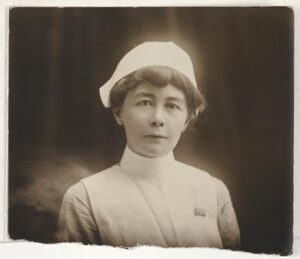by Miles Franklin This tribute to the women ‘back home’, was written while Franklin was serving with the Scottish Women’s Hospitals, attached to the Serbian Army at Ostrovo, Macedonia. It appeared in the Sydney Morning Herald of 24 April 1918.
This tribute to the women ‘back home’, was written while Franklin was serving with the Scottish Women’s Hospitals, attached to the Serbian Army at Ostrovo, Macedonia. It appeared in the Sydney Morning Herald of 24 April 1918.
On Active Service Somewhere in the Balkans.
Oct. 31, 1917
From shop to shop we chase for wool
To make your knitted hose,
Then choose one colour for the leg,
Another for the toes;
But whether black or grey or red,
Whate’er the colour be,
The love we put into our work
Is boundless as the sea.
We chase the wool, you chase the Turks,
And each of us gets there,
Australian grit and knitted socks
Will stand the hardest wear.
When Mary Mission of Lang Lang, Vic., slipped a sheet of paper with these lines on them into the toe of a pair of socks, on August 8, 1916, she little dreamt that I should be wearing them in a tent in Macedonia during October, 1917. Neither did I. Mais, c’est la guerre! C’est la guerre!
Also, c’est l’automne, and old Kajmackalan, a Kosciusko of these regions, which a year ago felt in one of the fiercest battles of the war, already has a crown of snow, some weeks old. He is a kingly sight tipped with the rising, or clear against the sinking sun, with veils of the mist about his base and flanked on every side by far lines of peaks, which,after prairie flatness refresh the soul, and whose blueness intensifies a nostalgia for the Bogongs and Tidbinbillies, which is ten years old.
The winds rushing down the valleys between the ancient, denuded hills, carrying heavy
rains, which make camp existence a soggy thing and cold, are presaging the full brusquerie of a Balkan winter, and announce the time of burrowings In the “dump” for warm clothing for the patients. In this cheerful adventure it has been my privilege to act Man Friday to Sister Saunders, a distinguished veteran of this front or fronts, who had undergone internment in Austria, and In company with Dr. Agnes Bennett (of Sydney) and other members of her unit, has recently been decorated by the Serbian Government.






Great article thanks, loved hearing about the knitting of socks and the poems that accompanied them- amazing!
Thanks for commenting Lorraine. I meant to reply to you directly but I missed my indent.
In some ways I feel I get closer to Miles Franklin reading these pieces of journalism than I do her letters and diaries.